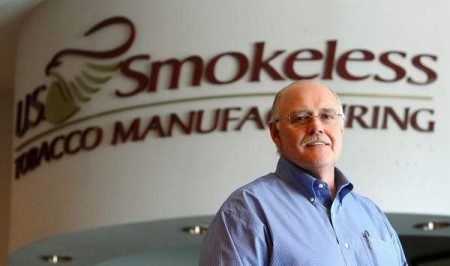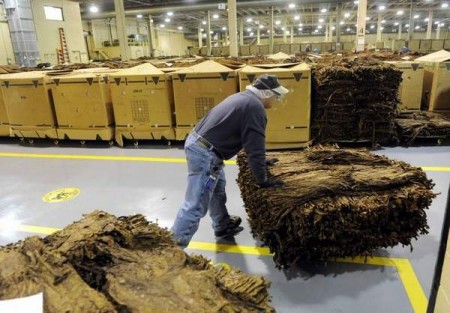Source: The Tennessean
Author: Anita Wadhwani
By any name or variety you choose — call it snuff, dip, chew or plug — smokeless tobacco is making a comeback, and Tennessee farmers, factory workers and consumers are playing a major role in the renewed buzz.
Farmers here and in Kentucky who once made a good living off raising burley tobacco for cigarettes have had to eliminate 40 percent of acreage devoted to that crop as demand has declined, while farmers who cultivate the dark tobacco used for chewing have been able to expand their fields by 22 percent in three years.
Now, the massive marketing muscle of the nation’s biggest tobacco companies — Altria Group and its subsidiary Philip Morris USA, which owns the 100-year-old U.S. Smokeless Tobacco Co. factory within view of the state Capitol, and R.J. Reynolds, which runs its smokeless operations out of a Memphis factory — are battling for market dominance.
Together, the two manufacturers already control 90 percent of the American smokeless tobacco sector with brands such as U.S. Smokeless’ Skoal and R.J. Reynolds’ Kodiak.
They’re competing with new fruit- and mint-flavored products (some packaged to look like miniature cigarette packs) to attract a new generation of consumers and entice ex-smokers looking for nicotine- infused alternatives.
Former cigarette smokers like Dave Kenner, 31, a construction worker making a pit stop at a West Nashville convenience store last week, said he switched to Red Seal Wintergreen smokeless because heavily taxed cigarettes cost too much — nearly $300 a month to feed his two-pack-a-day habit.
Round tins of chewing tobacco cost less and still satisfy Kenner’s taste for nicotine.
“It’s more like three bucks a day, I still get the nicotine, and it doesn’t taste half bad,” Kenner said. “My girlfriend isn’t crazy about it, but she likes it better than smoking.”
The decline in U.S. rates of cigarette smoking has led to an unexpected boon for the smokeless tobacco industry, historically centered in downtown Nashville and a surrounding 100-mile radius that encompasses farms and processing facilities between here and Hopkinsville, just over the Kentucky border.
Even as other Tennessee manufacturing jobs have vanished — 71,000 and counting since the recession officially began three years ago — the U.S. Smokeless Tobacco Co. plant on Eighth Avenue has prospered without a layoff since 1988. Plans now call for adding a second and possibly third shift of workers to the assembly line next month.
Once available only in the dark, loose variety that stained teeth and created a socially unappealing need to regularly spew dark streams of saliva, smokeless tobacco is now available in “spit-free” forms.
Those range from small, disposable tea-bag-like “snus” (pronounced “snoose”) products that conceal the brown tobacco within, to toothpicks and strips in flavors such as cherry, grape and wintergreen.
Smokeless brings in billions
It’s no accident that smokeless tobacco has attracted the interest of cigarette makers like Philip Morris USA.
Parent company Altria Group bought U.S. Smokeless (the top smokeless company) for $11.7 billion in 2009.
The company is diversifying its Nashville operations to provide an expanded array of smokeless products in addition to its best-known and decades-old Copenhagen and Skoal brands.
“We weren’t in the smokeless market, but our testing told us we needed to get into the space in a big way,” said Ken Garcia, a spokesman for Richmond, Va.-based Altria.
“It’s a growth industry for us, and we think it will continue to be for local operations.”
Last week, the Fortune 500 company reported a 27 percent increase in fourth-quarter income, even though it’s selling fewer cigarettes.
Revenue from smokeless tobacco brands including longtime Nashville products Copenhagen and Skoal, as well as the newly introduced Marlboro snus marketed at ex-smokers, grew to more than $1.45 billion in smokeless product sales in 2010
The expanding consumer market has translated into growth for the Nashville U.S. Smokeless Tobacco factory complex across the street from the Nashville Farmers’ Market downtown.
More products offered
The factory has been in continuous operation since the early 20th century, said plant manager Wayne Whiting, who worked his way up to management after starting on the factory floor in the mid-1970s at the age of 17.
“When I first started … we ran two products,” he said. “Now we’re running a multitude of products and operate some parts of the plant 22 hours a day.”
The Nashville plant employs 400 people. Automation and increased consumer demand have led to an increase in output from 100 tins a minute to 400, most shipped directly to retailers like Walmart or convenience store chains.
With Altria buying U.S. Smokeless, the Nashville plant has started making new products that mirror the parent company’s best-known cigarette brands, such as Marlboro snus, packaged in a slim, silver-and-blue cardboard box.
Altria boasts a 2,500-member sales force that connects the company to 200,000 stores nationwide. Competition is heating up.
R.J. Reynolds Tobacco Co., the nation’s No. 2 cigarette maker, bought the 200-year-old American Snuff Co. — U.S. Smokeless’ direct competitor — in 2006.
Last year, the company said it would invest $133 million in a new manufacturing facility in Memphis to make its own “snus-like” products linked to its iconic Camel cigarette brand.
Surge helps TN, KY growers
The resurgence of smokeless products has helped farmers in Tennessee and southern Kentucky plug into new markets.
Buddy Bryant, 51, is a fourth-generation tobacco farmer whose 290-acre tobacco operation just outside Adams, Tenn., helps support Bryant’s family of four as well as his brother’s family, the families of two adult nephews and his parents.
Between 2005 and 2009, the number of acres in Tennessee devoted to dark tobacco increased from 6,000 to 7,300, according to the Knoxville-based Center for Tobacco Grower Research, which receives funding from Philip Morris. The production value grew from about $42 million to $57 million.OCF
“The demand for smoking has gone way down, and farmers know what that means,” said Jane Howell Starnes, the director. “We’re seeing more switch completely from burley to dark (tobacco), but it’s still an uncertain future for farmers.”
Farmers operate on a pre-season contract basis with U.S. Smokeless, bringing tobacco to the Hopkinsville, Ky., processing facility. At the plant, the tobacco is sorted, aged and then shipped to either the Nashville plant or one in Lincoln Park, Ill.
Because of a short retail-shelf life, all tobacco shipments are based on orders, said plant manager Danny Kingins, a 27-year employee who also raises dark tobacco on his family farm.
The industry isn’t without controversy.
Anti-tobacco advocates armed with new data that show an increase in the popularity of smokeless tobacco among teenage boys are advocating for tighter regulations and stiffer taxes comparable to those put on cigarettes.
“We’ve seen a big change in demographic for this from being primarily a habit for older men to a habit of younger men,” said Danny McGoldrick, vice president for the Washington-based Campaign for Tobacco Free Kids.
A recent ban on flavored tobacco products by the federal government doesn’t apply to smokeless products.
“The two big boys — Philip Morris and R.J. Reynolds — are making flavors like cherry that appeals to kids. It’s more cool to use,” McGoldrick said.
Altria also is contending with claims that the product causes mouth, tongue and throat cancers among all ages of users. Earlier this month, the company settled a suit against U.S. Tobacco by the family of a 42-year-old North Carolina man who died of mouth cancer and had used smokeless tobacco products since he was 13 years old.
The $5 million settlement is believed to be the first of its kind involving smokeless products.
In 2012, the U.S. Food and Drug Administration is expected to report to the secretary of Health and Human Services on whether the products pose a threat to children and teens.



Leave A Comment
You must be logged in to post a comment.